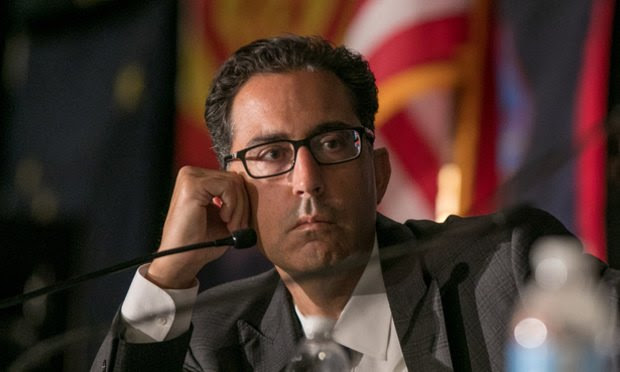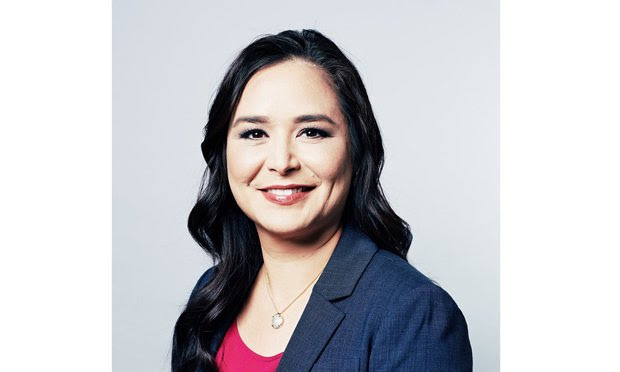What's Next: This 1947 SCOTUS Ruling Could Define the Gig Economy Workforce + Law Firms Flock to Lit Funders + Zoom is Too Big for 'Legal Gobbledy Gook'
U.S. District Judge Vince Chhabria of the Northern District of California said his clerk unearthed a decades-old decision that could dispel any doubt of whether ridesharing drivers are considered involved in interstate commerce
April 08, 2020 at 07:30 AM
9 minute read
Welcome back for another week of What's Next, where we report on the intersection of law and technology. Here's what we've got for you today:
>> A mid-century U.S. Supreme Court ruling could spell trouble for gig economy worker misclassification lawsuits.
>> Economic turmoil is bad for business but seems to be good for litigation funding.
>> Zoom's new privacy policy: ditching the legal speak.
Let's chat: Email me at [email protected] and follow me on Twitter at @a_lancaster.
 U.S. District Judge Vince Chhabria, Northern District of California. Photo: Jason Doiy/ALM
U.S. District Judge Vince Chhabria, Northern District of California. Photo: Jason Doiy/ALM
An Old Ruling in a New Employment Fight
In a hearing last week where lawyers representing Lyft drivers argued for an emergency motion that would reclassify the workers as employees eligible for California's paid sick leave, U.S. District Judge Vince Chhabria of the Northern District of California mentioned that his clerk unearthed a 1947 U.S. Supreme Court decision that could dispel any doubt of whether ridesharing drivers could be considered involved with interstate commerce, and thus, exempt from employer arbitration agreements under the Federal Arbitration Act.
"The more I think about it, the more firmly I think Lyft drivers are not engaged in interstate commerce," Chhabria said, noting that he hadn't seen any other court cite the case while dealing with the same issue.
Recently, lawyers representing gig workers have had a couple wins, where courts ruled that drivers were not bound by employer arbitration agreements since their business involved interstate commerce. In a March 27 decision, U.S. District Judge Indira Talwani of the District of Massachusetts ruled that Lyft drivers qualified for the FAA's Section 1 exemption that applies to "contracts of employment of seamen, railroad employees, or any other class of workers engaged in foreign or interstate commerce."
In November, San Francisco County Superior Court Judge Richard Ulmer described the interstate boundary between California and Nevada that Uber driver Sangam Patel frequently traversed as a "line in the street," and allowed California Labor Secretary Julie Su, a respondent in the case, to move forward with limited discovery to make a case that Uber drivers engage in interstate commerce. Still, Littler Mendelson was able to dismiss the case without prejudice on March 24.
In the 73-year-old Supreme Court decision, U.S. v. Yellow Cab, the government alleged that taxi companies in Chicago were violating antitrust laws by dividing up the market for rides to and from interstate railways. However, since the cab drivers did not have any contractual arrangement with the railroads, "their relationship to interstate transit is only casual and incidental," the high court ruled.
In last week's Lyft hearing, Chhabria asked "… if taxi drivers are not engaged in interstate commerce, how could Lyft drivers be considered engaged in interested commerce?"
In a supplemental brief filed Monday, attorneys from Lichten & Liss-Riordan, who are representing Lyft drivers in the worker misclassification suit, wrote that U.S. v. Yellow Cab is not a dispositive case. The plaintiffs lawyers assert that Baltimore & O. S. W. R. Co. v. Burtch and Philadelphia & R.R. Co. v. Hancock, which were decided shortly before the passage of the FAA, are more relevant.
"In Burtch, the Supreme Court held that workers who unloaded freight from trains that had transported the freight from out of state, were sufficiently engaged in interstate commerce so as to be covered by [the Federal Employers' Liability Act]," they wrote. "In Hancock, the court similarly held that railroad workers who never traveled interstate were nonetheless engaged in interstate commerce because the workers transported goods that moved interstate."
Lyft's attorneys from Keker, Van Nest and Peters wrote in their supplemental brief that "The plaintiffs in Hancock and Burtch performed work that was necessarily a part of interstate transport, whereas drivers using the Lyft platform provide inherently local transportation whose 'relationship to interstate transit is,' at best, 'casual and incidental.'"
In a Tuesday order, Chhabria granted Lyft's motion to compel arbitration on plaintiffs' claims for individualized relief, struck the class allegations and remanded the public injunction to San Francisco Superior Court.
Chhabria said in the opinion that Yellow Cab demonstrates why Lyft drivers are not, engaged in interstate commerce as a class.
"It's difficult to see how a different analysis could apply to these modern-day taxidrivers," he wrote. "Like the drivers in Yellow Cab, Lyft drivers' 'relationship to interstate transit is only casual and incidental.' The drivers thus lack the requisite 'practical, economic continuity' with interstate air or rail transportation."
 Allison Chock, chief investment officer of Bentham IMF.
Allison Chock, chief investment officer of Bentham IMF.
A Run on Litigation Funding
After Allison Chock read an alarming coronavirus article from an Italian doctor, she decided to close all of Bentham IMF's U.S. offices on March 12 and transition her team to remote work. The chief investment officer and U.S. legal counsel for the litigation funder said the hardest part wasn't taking Bentham virtual, it's been everything that came after.
"We are drinking from the firehose at the moment," Chock said, noting that the number of inquiries for funding have "not quite doubled."
In the last two years, the company has been preparing for an economic downturn and has built up its insolvency practice. So, the lit funder was prepared for the bombardment of funding requests for insolvency cases it's received in the last month, she said. Unsurprisingly, Bentham's insurance coverage practice lead is also receiving a flood of inquiries. But Chock has also seen an uptick in interest in companies assessing liquidity and monetizing court judgements.
Due diligence requires some extra steps to ensure collectability these days, as well. "What you would consider a no-problems-in-collections-type of defendant—there is no such thing now," she said. Bentham is now considering the potential effects of COVID-19 on businesses and what public statements they have made, she said.
And while federal courts are continuing to issue orders, Chock is preparing for a backlog of cases and delays in state courts. For both current and future defendants, her team is adjusting out timelines for expected returns.
"We're very busy in our work-from-home cocoons," she said.

Zoom's GC: The Future of Work Has Changed Forever
Between adapting to a global pandemic, getting 2.2 million new active users this year, and litigation and scrutiny over privacy practices, Zoom Video Communications' legal team is working around the clock.
But Zoom's Chief Legal Officer Aparna Bawa still took the time to sit down with Law.com's Vanesssa Blum for our Legal Speak podcast.
Bawa, who joined Zoom in 2018 after stints at Magento Commerce, Nimble Storage, Inphi Corp. and Wilson Sonsini Goodrich & Rosati, said he thinks "the future of work has changed forever."
"There's nothing like almost the entire population of the United States being told to shelter in place and it begs the question, 'How are we going to get through our daily lives? How are we going to deliver the things that we think we need to deliver?' … We're not just going to stop working. That's just not the United States way. And even globally nobody is going to think to stop working …"
Bawa said his focus has shifted intensely to privacy and security in the last month. And as Zoom transformed into a household name virtually overnight, he said using the typical legal words and phrases across the terms of service and websites don't cut it anymore. He said "legal gobbledy gook" works for business but it doesn't work for people. That means simplifying language.
"For example, so instead of five sentences to tell you that we don't sell data, we just say we don't sell your data. Period. That's it. There's not exceptions. Nothing else. Most lawyers will want to put a comma, they'll want to put some caveats, they'll want to put some notices, and I think forcing us to just simplify and talk like everyday people, not lawyers, that's been the critical focus for me at Zoom, because we are a very genuine, conscientious company, and we need to make people realize that. We don't want to be the company that folks don't trust. We want to be the company that folks trust."
Listen to the full podcast here.

On the Radar
How to Lose An Office in 10 Days Perkins Coie had been laying the foundation to transition to a remote workforce for more than a year before the World Health Organization declared a global pandemic. But the firm wasn't forecasting an international health crisis. Instead, it was just trying to get ahead of rising real estate costs. That preparation allowed the firm's Seattle office to go virtual in just 10 days. Read more from Patrick Smith here.
COVID-19 Trumps Data Security The cybersecurity nightmares once anguishing general counsel has been overshadowed by another boogeyman: a global pandemic. A Morrison & Foerster survey found that just 29% of the 110 in-house participants said data security is a major risk to their international businesses, and 18% said privacy was a top priority. As coronavirus infects more than 350,000 Americans and the U.S. economy, general counsels have shifted their focus to employment and human resources issues. However, David Newman, a partner at MoFo in Washington, D.C., and head of the firm's coronavirus task force said as difficult as things are now, a major data breach would only make matters worse. Read more from Phillip Bantz here.
Media Conglomerates Unite Content arms of Columbia Pictures, Amazon and Disney have channeled a common enemy. The companies have sued Nitro TV, an internet protocol TV provider that advertises more than 6,000 HD streams. The media giants' Jenner & Block attorneys said Nitro TV's business model equates to a "brazen, large-scale copyright infringement operation." This isn't the first time the entertainment conglomerates have tag-teamed litigation against reportedly rogue streamers. Read more from Scott Graham here.
Thanks for reading. We will be back next week with more What's Next. Stay safe and healthy, everyone!
This content has been archived. It is available through our partners, LexisNexis® and Bloomberg Law.
To view this content, please continue to their sites.
Not a Lexis Subscriber?
Subscribe Now
Not a Bloomberg Law Subscriber?
Subscribe Now
NOT FOR REPRINT
© 2025 ALM Global, LLC, All Rights Reserved. Request academic re-use from www.copyright.com. All other uses, submit a request to [email protected]. For more information visit Asset & Logo Licensing.
You Might Like
View All

What's Next: Judge to Quash Twitter Subpoena | SCOTUS Won't Review Trial Ban
4 minute read

Law Firms Mentioned
Trending Stories
- 1Some Thoughts on What It Takes to Connect With Millennial Jurors
- 2Artificial Wisdom or Automated Folly? Practical Considerations for Arbitration Practitioners to Address the AI Conundrum
- 3The New Global M&A Kings All Have Something in Common
- 4Big Law Aims to Make DEI Less Divisive in Trump's Second Term
- 5Public Notices/Calendars
Who Got The Work
J. Brugh Lower of Gibbons has entered an appearance for industrial equipment supplier Devco Corporation in a pending trademark infringement lawsuit. The suit, accusing the defendant of selling knock-off Graco products, was filed Dec. 18 in New Jersey District Court by Rivkin Radler on behalf of Graco Inc. and Graco Minnesota. The case, assigned to U.S. District Judge Zahid N. Quraishi, is 3:24-cv-11294, Graco Inc. et al v. Devco Corporation.
Who Got The Work
Rebecca Maller-Stein and Kent A. Yalowitz of Arnold & Porter Kaye Scholer have entered their appearances for Hanaco Venture Capital and its executives, Lior Prosor and David Frankel, in a pending securities lawsuit. The action, filed on Dec. 24 in New York Southern District Court by Zell, Aron & Co. on behalf of Goldeneye Advisors, accuses the defendants of negligently and fraudulently managing the plaintiff's $1 million investment. The case, assigned to U.S. District Judge Vernon S. Broderick, is 1:24-cv-09918, Goldeneye Advisors, LLC v. Hanaco Venture Capital, Ltd. et al.
Who Got The Work
Attorneys from A&O Shearman has stepped in as defense counsel for Toronto-Dominion Bank and other defendants in a pending securities class action. The suit, filed Dec. 11 in New York Southern District Court by Bleichmar Fonti & Auld, accuses the defendants of concealing the bank's 'pervasive' deficiencies in regards to its compliance with the Bank Secrecy Act and the quality of its anti-money laundering controls. The case, assigned to U.S. District Judge Arun Subramanian, is 1:24-cv-09445, Gonzalez v. The Toronto-Dominion Bank et al.
Who Got The Work
Crown Castle International, a Pennsylvania company providing shared communications infrastructure, has turned to Luke D. Wolf of Gordon Rees Scully Mansukhani to fend off a pending breach-of-contract lawsuit. The court action, filed Nov. 25 in Michigan Eastern District Court by Hooper Hathaway PC on behalf of The Town Residences LLC, accuses Crown Castle of failing to transfer approximately $30,000 in utility payments from T-Mobile in breach of a roof-top lease and assignment agreement. The case, assigned to U.S. District Judge Susan K. Declercq, is 2:24-cv-13131, The Town Residences LLC v. T-Mobile US, Inc. et al.
Who Got The Work
Wilfred P. Coronato and Daniel M. Schwartz of McCarter & English have stepped in as defense counsel to Electrolux Home Products Inc. in a pending product liability lawsuit. The court action, filed Nov. 26 in New York Eastern District Court by Poulos Lopiccolo PC and Nagel Rice LLP on behalf of David Stern, alleges that the defendant's refrigerators’ drawers and shelving repeatedly break and fall apart within months after purchase. The case, assigned to U.S. District Judge Joan M. Azrack, is 2:24-cv-08204, Stern v. Electrolux Home Products, Inc.
Featured Firms
Law Offices of Gary Martin Hays & Associates, P.C.
(470) 294-1674
Law Offices of Mark E. Salomone
(857) 444-6468
Smith & Hassler
(713) 739-1250








